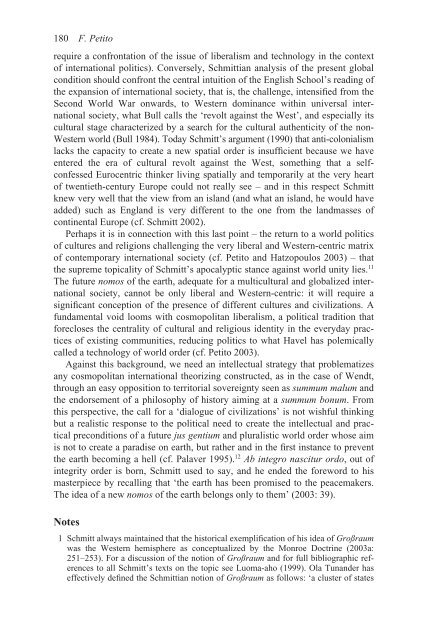The International Political Thought of Carl Schmitt: Terror, Liberal ...
The International Political Thought of Carl Schmitt: Terror, Liberal ...
The International Political Thought of Carl Schmitt: Terror, Liberal ...
You also want an ePaper? Increase the reach of your titles
YUMPU automatically turns print PDFs into web optimized ePapers that Google loves.
180 F. Petito<br />
require a confrontation <strong>of</strong> the issue <strong>of</strong> liberalism and technology in the context<br />
<strong>of</strong> international politics). Conversely, <strong>Schmitt</strong>ian analysis <strong>of</strong> the present global<br />
condition should confront the central intuition <strong>of</strong> the English School’s reading <strong>of</strong><br />
the expansion <strong>of</strong> international society, that is, the challenge, intensified from the<br />
Second World War onwards, to Western dominance within universal international<br />
society, what Bull calls the ‘revolt against the West’, and especially its<br />
cultural stage characterized by a search for the cultural authenticity <strong>of</strong> the non-<br />
Western world (Bull 1984). Today <strong>Schmitt</strong>’s argument (1990) that anti-colonialism<br />
lacks the capacity to create a new spatial order is insufficient because we have<br />
entered the era <strong>of</strong> cultural revolt against the West, something that a selfconfessed<br />
Eurocentric thinker living spatially and temporarily at the very heart<br />
<strong>of</strong> twentieth-century Europe could not really see – and in this respect <strong>Schmitt</strong><br />
knew very well that the view from an island (and what an island, he would have<br />
added) such as England is very different to the one from the landmasses <strong>of</strong><br />
continental Europe (cf. <strong>Schmitt</strong> 2002).<br />
Perhaps it is in connection with this last point – the return to a world politics<br />
<strong>of</strong> cultures and religions challenging the very liberal and Western-centric matrix<br />
<strong>of</strong> contemporary international society (cf. Petito and Hatzopoulos 2003) – that<br />
the supreme topicality <strong>of</strong> <strong>Schmitt</strong>’s apocalyptic stance against world unity lies. 11<br />
<strong>The</strong> future nomos <strong>of</strong> the earth, adequate for a multicultural and globalized international<br />
society, cannot be only liberal and Western-centric: it will require a<br />
significant conception <strong>of</strong> the presence <strong>of</strong> different cultures and civilizations. A<br />
fundamental void looms with cosmopolitan liberalism, a political tradition that<br />
forecloses the centrality <strong>of</strong> cultural and religious identity in the everyday practices<br />
<strong>of</strong> existing communities, reducing politics to what Havel has polemically<br />
called a technology <strong>of</strong> world order (cf. Petito 2003).<br />
Against this background, we need an intellectual strategy that problematizes<br />
any cosmopolitan international theorizing constructed, as in the case <strong>of</strong> Wendt,<br />
through an easy opposition to territorial sovereignty seen as summum malum and<br />
the endorsement <strong>of</strong> a philosophy <strong>of</strong> history aiming at a summum bonum. From<br />
this perspective, the call for a ‘dialogue <strong>of</strong> civilizations’ is not wishful thinking<br />
but a realistic response to the political need to create the intellectual and practical<br />
preconditions <strong>of</strong> a future jus gentium and pluralistic world order whose aim<br />
is not to create a paradise on earth, but rather and in the first instance to prevent<br />
the earth becoming a hell (cf. Palaver 1995). 12 Ab integro nascitur ordo, out <strong>of</strong><br />
integrity order is born, <strong>Schmitt</strong> used to say, and he ended the foreword to his<br />
masterpiece by recalling that ‘the earth has been promised to the peacemakers.<br />
<strong>The</strong> idea <strong>of</strong> a new nomos <strong>of</strong> the earth belongs only to them’ (2003: 39).<br />
Notes<br />
1 <strong>Schmitt</strong> always maintained that the historical exemplification <strong>of</strong> his idea <strong>of</strong> Großraum<br />
was the Western hemisphere as conceptualized by the Monroe Doctrine (2003a:<br />
251–253). For a discussion <strong>of</strong> the notion <strong>of</strong> Großraum and for full bibliographic references<br />
to all <strong>Schmitt</strong>’s texts on the topic see Luoma-aho (1999). Ola Tunander has<br />
effectively defined the <strong>Schmitt</strong>ian notion <strong>of</strong> Großraum as follows: ‘a cluster <strong>of</strong> states
















